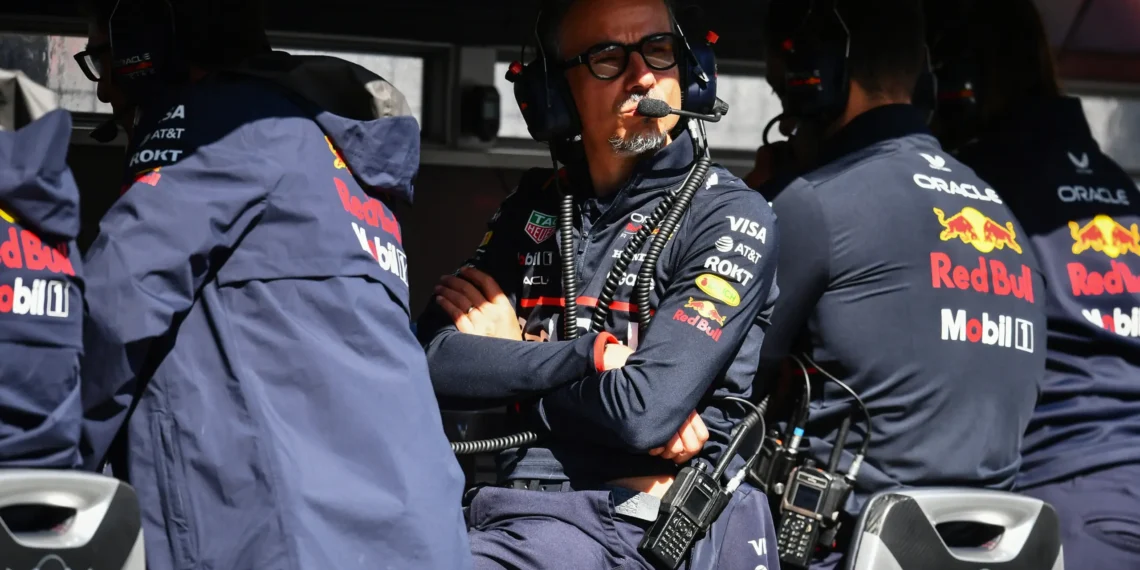Title: Red Bull Racing’s Remarkable Revival: How Laurent Mekies is Transforming the Team into a Powerhouse
In the high-stakes world of Formula 1, every decision can make or break a team’s fortune. Enter Laurent Mekies, the new boss of Red Bull Racing, whose impact since his arrival is already sending shockwaves through the paddock. Helmut Marko, Red Bull’s motorsport advisor, lauds Mekies’ transformative influence, especially in the wake of a turbulent period that saw the team tumble from their championship-winning heights to a disappointing fourth place in the standings.
Mekies, who stepped in after the long-serving Christian Horner was ousted following two decades at the helm, joined Red Bull in July from the sister team, Racing Bulls. His arrival comes at a critical juncture, as Red Bull aims to claw back its competitive edge against fierce rivals McLaren, Ferrari, and Mercedes. But don’t count them out just yet! The team has shown signs of resurgence, with Max Verstappen clinching podium finishes in the last two races, including an exhilarating victory at Monza.
In a passionate analysis post-Italian Grand Prix, Marko expressed his enthusiasm for Mekies’ strategic changes, particularly highlighting a newfound openness among the technical team. “They are not blind to what the simulation says,” Marko stated, emphasizing the crucial role of driver feedback in shaping car performance. This shift represents a significant cultural change in a team previously dominated by rigid decision-making.
Verstappen, the four-time world champion, has been instrumental in this transition. A notable incident during the Italian GP revealed how Mekies’ leadership is fostering a more collaborative environment. When certain engineers advocated for a higher downforce setup—much to Verstappen’s dismay—the driver’s preferences ultimately prevailed, allowing him to dominate the race from pole position. Marko noted, “The engineers are listening more to the driver. If you have such a fast and experienced driver, I think that’s the right way.”
The trend of appointing technical experts to lead F1 teams is gaining momentum, as teams recognize the complexity of the sport ahead of the regulatory changes coming in 2026. Mekies’ appointment reflects a broader shift from business-oriented leaders to those with deep technical expertise. With Red Bull poised to introduce an in-house power unit for the first time since joining F1 in 2005, Mekies is at the forefront of this pivotal evolution.
Marko stated emphatically, “Appointing him was the right decision. It’s now much more structured from a technical perspective.” This tighter integration between drivers and engineers is already yielding impressive results—while the car may not have fundamentally changed, the level of coordination has unlocked new performance potential.
As the 2025 season approaches its final eight rounds, Marko’s optimism is palpable. “With the speed we’ve shown, we should hopefully be able to compete on our own merit at almost every circuit,” he remarked. Notably, the upcoming Singapore Grand Prix stands out as a unique challenge—the only race Red Bull has yet to conquer. “But maybe it’ll work out there too,” Marko added, eyeing further victories to salvage a championship season that has slipped from their grasp.
In the cutthroat arena of Formula 1, where speed and strategy reign supreme, Laurent Mekies is not just steering Red Bull Racing back on course—he’s igniting a revival that could see them reclaim their throne. As fans and competitors alike watch with bated breath, one thing is clear: the new era at Red Bull is just beginning, and it promises to be thrilling.










